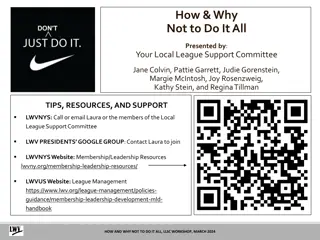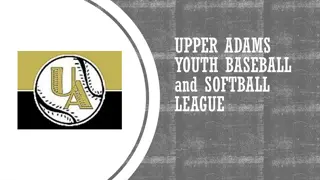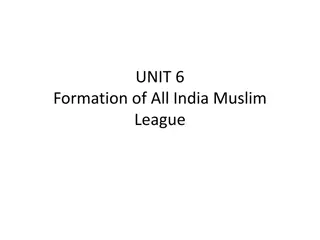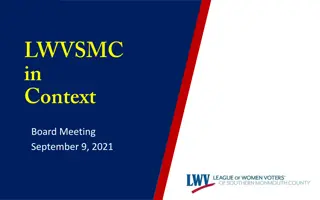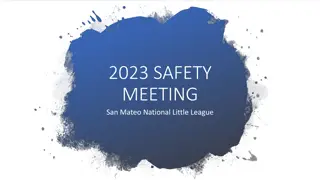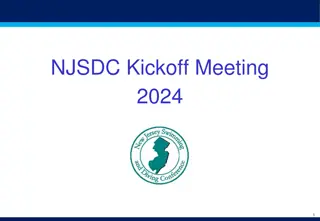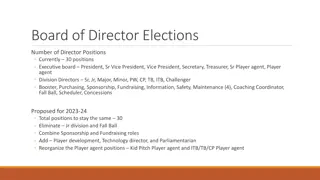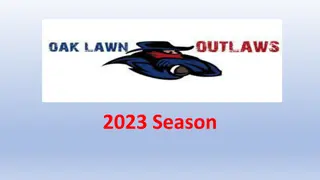Little League Secretary Training Overview
This secretary training overview covers the responsibilities of a Little League secretary, including recording activities, maintaining files, managing membership lists, keeping meeting minutes, and more. It emphasizes the role of the secretary as the custodian of important records such as the constitution, by-laws, meeting agendas, and membership lists. Understanding membership categories and the rights of regular members is crucial. The importance of accurate minutes in recording meeting details is highlighted, including attendees, meeting type, and agenda items.
Download Presentation

Please find below an Image/Link to download the presentation.
The content on the website is provided AS IS for your information and personal use only. It may not be sold, licensed, or shared on other websites without obtaining consent from the author.If you encounter any issues during the download, it is possible that the publisher has removed the file from their server.
You are allowed to download the files provided on this website for personal or commercial use, subject to the condition that they are used lawfully. All files are the property of their respective owners.
The content on the website is provided AS IS for your information and personal use only. It may not be sold, licensed, or shared on other websites without obtaining consent from the author.
E N D
Presentation Transcript
Secretary Training Presented by: Allen Pryor District Administrator California District 43 Little League
1. Be responsible for recording the activities of the Local League and maintain appropriate files, mailing lists and necessary records. Duties and Responsibilities 2. Maintain a list of all Regular, Sustaining and Honorary Members, Directors and committee members and give notice of all meetings of the Local League, the Board of Directors and Committees. 3. Keep the minutes of the meetings of the Members, the Board of Directors and the Executive Committee, and cause them to be recorded in a book kept for that purpose. 4. Conduct all correspondence not otherwise specifically delegated in connection with said meeting and shall be responsible for carrying out all orders, votes and resolutions not otherwise committed.
Custodian of Records 1. Constitution 2. By-Laws 3. Meeting Agendas 4. Meeting Minutes 5. Membership List 6. Additional Helpful Items to Archive: a. Safety Plan b. Player/Parent Contacts
Membership Know who your members are! Constitution Article III, Section 2 1. Player-Members 2. Regular Members 3. Honorary Members 4. Sustaining Members
Regular Members Are the only members with rights, duties, and obligations in the management of the League. 1. Any adult person actively interested in furthering the objectives of the Local League may become a Regular Member upon election and payment of dues as hereinafter provided. The secretary shall maintain the roll of membership to qualify voting members. Only Regular Members in good standing are eligible to vote at General Membership Meetings. All Officers, Board Members, Committee Members, Managers, Coaches, Volunteer Umpires, and other elected or appointed officials must be active Regular Members in good standing. Regular Members of the league automatically include all current Managers, Coaches, Volunteer Umpires, Board Members, Officers of the Board, and any other person who is recognized by the Board as a volunteer in the Local League NO ONE ELSE is AUTOMATICALLY a Regular Member unless otherwise specified by your league constitution. 2. 3. 4. 5.
Minutes The essentials of the record 1. the kind of meeting, "regular" (or stated) or "special; and Board of Directors or Membership Meeting 2. name of the assembly; 3. date of meeting and place, when it is not always the same; 4. Record of the attendees a. Directors b. Members c. Guests
Minutes ...continued 5. Approval of previous meeting minutes 6. Old Business (business that tabled or needs update from previous meetings) 7. New Business a. Officers Reports b. all the main motions (except such as were withdrawn) and points of order and appeals, whether sustained or lost, and all other motions that were not lost or withdrawn; 8. the hours of meeting and adjournment.
Minutes are not a transcription of every word spoken at the meeting. Record of the discussion should be limited, and only included if it s necessary for context of the topic being discussed. Don t include personal comments.
Regular Meeting vs Special Meeting A regular meeting is the periodic meeting of an assembly, which is held weekly, monthly, quarterly, or at similar intervals. The bylaws should state the day of the meeting (for example, "the first Monday of each month"), and the standing rules should state the hour of the meeting (for example, "8:00 p.m."). Special meetings are, well, special. According to Robert's Rules, they're called only if 1) something important comes up that must be dealt with before the next regular meeting, or 2) some particular business matter(s) is important enough that it needs to be the exclusive reason for the entire meeting.
Special meetings are essentially an emergency meeting. They can be called by action of the Board of Directors OR at the discretion of the President or Secretary OR: Regular vs Special Why does it matter? Special General Membership meetings: Upon the written request of a minimum of five members, the President or Secretary shall call a Special General Membership Meeting to consider the subject specified in the request. Special Meeting of the Board of Directors shall be called upon the written request of a number of Board Members as defined in your league constitution. (Article IV, Section 4) No business other than that specified in the notice of the meeting shall be transacted at any Special Meeting.
Closed Session/Executive Session What is a closed session? A. A meeting of the governing body that is not open to the public. Who may attend a closed session? A. Only the members of the governmental body have a right to attend the session The board may decide to invite in others such as the clerk, treasurer, town attorney, town employee, etc.
Can our whole meeting be a closed session? Closed Session/Executive Session ...continued A. If the chair knows that a closed session is anticipated, he or she must specifically state the subject matter that allows for the closed session on the agenda. Can an unanticipated closed session ever be held? A. If a meeting has been called with proper notice and a topic on the agenda allows for a closed session, the board may vote to have an unanticipated closed session. The topic to be discussed in closed session should be moved to the last item on the agenda.
What is the procedure for convening a closed session? Closed Session/Executive Session ...continued Call the meeting to order in open session. Motion to go into closed session is made. Chair announces specific business to be conducted. Roll call vote to go into closed session recorded as part of the minutes. To exit Closed Session, motion>vote to reconvene open session.
When should we enter closed session? Closed Session/Executive Session ...continued When discussing... Legal matters. Employment matters (example: Manager Selection or All-Star Selections) Disciplinary issues. Consideration of financial, medical, social, or personal information or preliminary consideration of specific personnel problems or the investigation of charges which if discussed in public would have an adverse effect upon the reputation of any person involved. Conducting business with competitive or bargaining implications.
Can we vote during closed session? Closed Session/Executive Session ...continued Yes, but you should try to avoid it. In most circumstances the body should have discussion in closed session and then return to open session to vote. Use common sense, and only vote in closed session if you feel it is absolutely necessary for bargaining purposes, etc.
Do we take minutes during a closed session? Closed Session/Executive Session ...continued Minutes should be taken in the closed session. Minutes should indicate the time the session started and ended,who was present, motions made, votes taken. Details of the discussion may be limited to identification of the topic discussed.
Can we record a closed session? Closed Session/Executive Session ...continued A. We recommend that recordings not be made of closed sessions because such recordings would be a public record subject to possible release.
Any regular member has a right to: Regular Members Rights 1. View the league s financial report. 2. View the League s Minutes 3. View the League s Governing Documents. 4. Make motions at a General Membership meeting. 5. Vote on motions at a General Membership meeting. 6. Participate on a league committee at the request of the Board. 7. Due process to face any disciplinary actions.
1. A regular member has the right to request documents. They should be delivered by the Secretary within a reasonable time period from the request. 2. A regular member must remain in good standing according to their league constitution in order to maintain their rights. Regular Members Rights ...continued
Due process Suspension or Termination: Membership may be terminated by resignation or action of the Board of Directors as follows. Regular Members Rights ...continued (a) The Board of Directors, by a two-thirds vote of those present at any duly constituted Board meeting, shall have the authority to discipline or suspend or terminate the membership of any Member of any class, including managers and coaches, when the conduct of such person is considered detrimental to the best interests of the Local League and/or Little League Baseball, Incorporated. The Member involved shall be notified of such meeting, informed of the general nature of the charges and given an opportunity to appear at the meeting to answer such charges.
A member will most likely only use their rights if there is a league problem.








